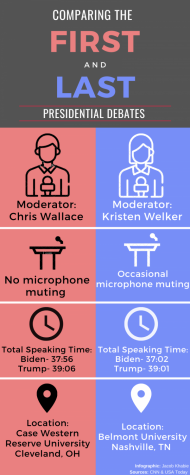Muting microphones at the presidential debate was not impactful enough
Many other factors helped contribute to more civil debate
October 25, 2020
Going into the presidential debate on Oct. 22, I was afraid we would get a repeat of the Sep. 29 debate, which as CNN anchor Jake Tapper said, was, “a hot mess inside a dumpster fire inside a train wreck.”
I was curious to see how the Commission on Presidential Debates’ new policy of microphone muting would help civilize America’s most glorified argument. The newest rule change, enacted after the September debate, dictated that at the beginning of each of the six segments when the moderator asked the opening question, each candidate would get two minutes of speaking time uninterrupted, where their opponent would be muted.

Going into the second and final debate, I was very excited to see how this new policy played out. The September debate left me disappointed with moderator Chris Wallace’s handling of interruptions, which, according to USA Today, allowed President Trump to speak for over one minute longer than Former Vice President Joe Biden. I hoped that by muting each candidate at selective times, it would help civilize the debate and allow for an equal speaking time distribution.
Thankfully, the debate was far more civil than the last one. For the most part, both candidates remained focused on policy and answered questions in full without too much interruption. However, the muted microphones did not play a big role as I thought they would have. Because there were only a few times where a candidate’s microphone could be muted, there were still 87 interruptions in total from President Trump and Former Vice President Biden, in comparison to 93 interruptions from the September debate, according to USA Today and the Washington Post. In addition, the gap in speaking time widened with Trump speaking two minutes longer than Biden overall.
As to what made Thursday’s debate feel more civil, I believe it was a variety of factors. I would be remiss if I didn’t bring up NBC’s Kristen Welker, who served as the moderator. She handled the debate with poise and grace and was frankly much more assertive than Wallace. Also, both candidates went into this debate with more serious mindsets than they did in September. For President Trump, this was his return to the debate stage after fighting COVID-19 and one of his last chances to make up for his falling poll numbers. For Former Vice President Biden, he understood that the last debate gave him an extraordinary boost in polling, and he was looking to maintain a lead and avoid a repeat of the 2016 election.
All in all, I did appreciate the new microphone-muting rule that the Commission on Presidential Debates introduced. The rule should stay in place for future debates. However, muting the candidates’ microphones was not as impactful as many thought it would be, and other enforcers of debate rules are still necessary.




